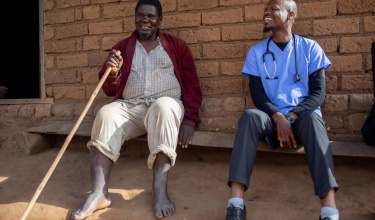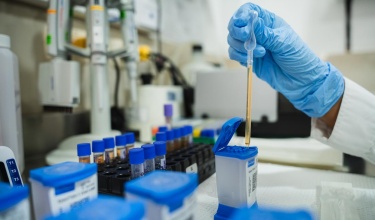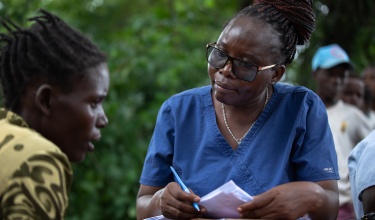

Malawi
Malawi
Malawians face a daunting HIV epidemic, a growing non-communicable disease (NCD) burden and high rates of infant and maternal mortality, while access to decentralized, high-quality care is scarce or unaffordable for most people. Even those who can pay for treatment are often unable to reach clinics, especially over mountainous terrain and rugged roads in remote areas.
Known locally as Abwenzi Pa Za Umoyo, Partners In Health in Malawi is building and supporting a model of integrated care in Neno District—through two hospitals, 12 health centers, and a network of 1,200 community health workers (CHWs)—to screen and refer patients for treatment of HIV, malnutrition, maternal and child health, mental health, and non-communicable diseases, such as hypertension, diabetes, and sickle cell anemia.
Our Impact

90% of mental health patients remain in ongoing care.

94% of people living with HIV are on antiretrovirals.

More than 4,500 patients each year receive food and housing support..
Community Health
A pillar of PIH in Malawi is the Community Health Department and its Program on Social and Economic Rights, or POSER, which empowers community members to live with dignity, security, and independence. POSER helps lift the financial burden of costs related to health care, ensuring that Neno’s most vulnerable have access to medical care and the basic necessities to stay healthy, such as housing, employment, and transportation.
PIH community health workers and clinicians, along with local community leaders, identify people who could benefit from POSER support through home visits, checkups at local health facilities, connections with local government, and community-based organizations. POSER staff register eligible people in the program and conduct a vulnerability assessment to gauge which of their needs are most urgent.
Once support begins, POSER staff ensure the continuity and effectiveness of care by regularly visiting clients and families at their home.
In 2018, 298 PIH community health workers (CHWs) serving two areas of Neno District transitioned from a paper-based data collection system to an electronic Mobile Health (mHealth) system known locally as Yendanafe. The system enables CHWs and the program team to collect and evaluate data electronically, via smartphones. Currently, 50% (7 of 14) of catchment sites are using Yendanafe, translating to a total of 629 CHWs. So far, at least 19,438 households are registered in Yendanafe and CHWs are tracking ongoing care to patients in these households.
Malnutrition
PIH in Malawi has adopted a household model for CHWs, meaning every household has a designated CHW who visits regularly and provides access to care even for patients not identified with illness. Through in-home malnutrition screenings, CHWs identify children in need of nutritional support and help families access specialized care at local clinics for moderate cases. For severe cases, they refer families to Neno District Hospital or Lisungwi Community Hospital. PIH supports both hospitals.
Through early detection, referral, and treatment, PIH works to prevent severe malnutrition and provide families with access to clinical services and social support programs.
Across Neno District, PIH's malnutrition program provides monitoring and lifesaving treatment for more than 2,400 children under 5 per year. It’s a ground-up, home-by-home system built on the foundation of CHWs, who provide vital, lifesaving care for their neighbors.
Integrated Care
Neno’s geographic challenges and cultural context have fostered PIH’s model of integrated care, in which all 14 clinics offer decentralized treatment for many chronic conditions—not only HIV, for example, but also hypertension, diabetes, chronic lung disease and mental illness, among others—so patients can make the most out of lengthy, costly trips to their health facility. Integrated care also reduces the fear of stigma, which can arise from attending a clinic that’s known as dedicated solely to HIV care.
Efforts to decentralize care began in 2015 and resulted in immediate increases in enrolled patients, by bringing care closer to communities and opening up access where it previously did not exist.
Integrating that care starts with PIH’s community- and facility-based screening program. Just as clinics integrate treatment, the screening program enables people to be tested for numerous conditions at special outreach events or each time they visit a clinic. Clinicians then refer people to appropriate services, including integrated chronic care clinics at district health facilities.
In 2018, Partners In Health in Malawi opened the country’s first advanced non-communicable disease (NCD) clinic at Neno District Hospital and Lisungwi Community Hospital, adding a secondary level of care to the primary care clinic for uncomplicated NCDs. The advanced NCD clinic provides specialized, integrated care to patients with severe, chronic conditions, such as type 1 diabetes and rheumatic heart disease.


